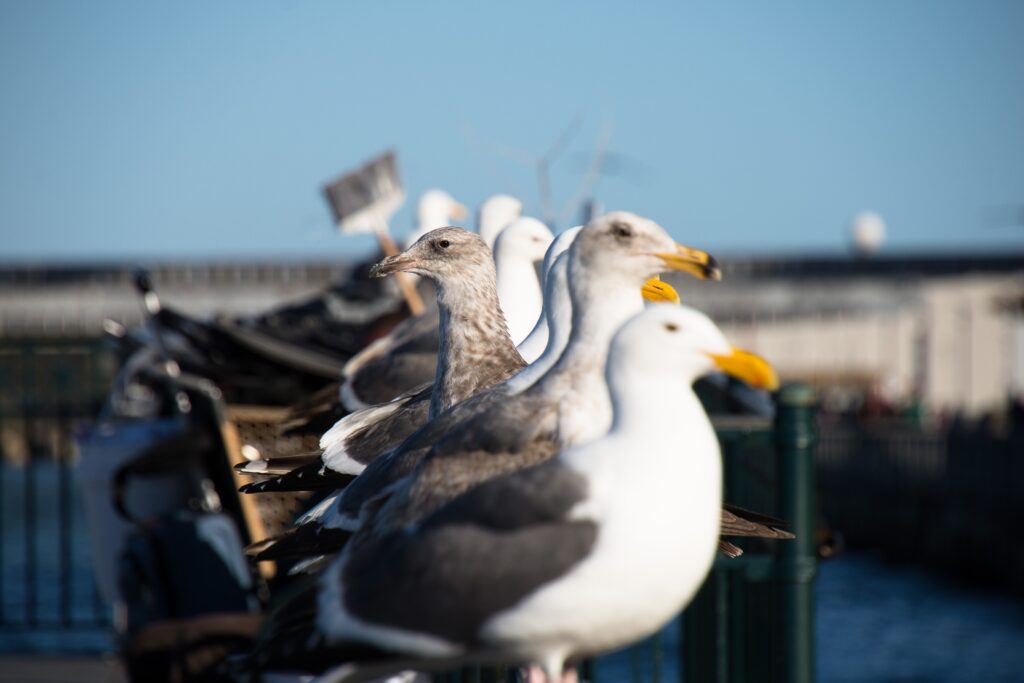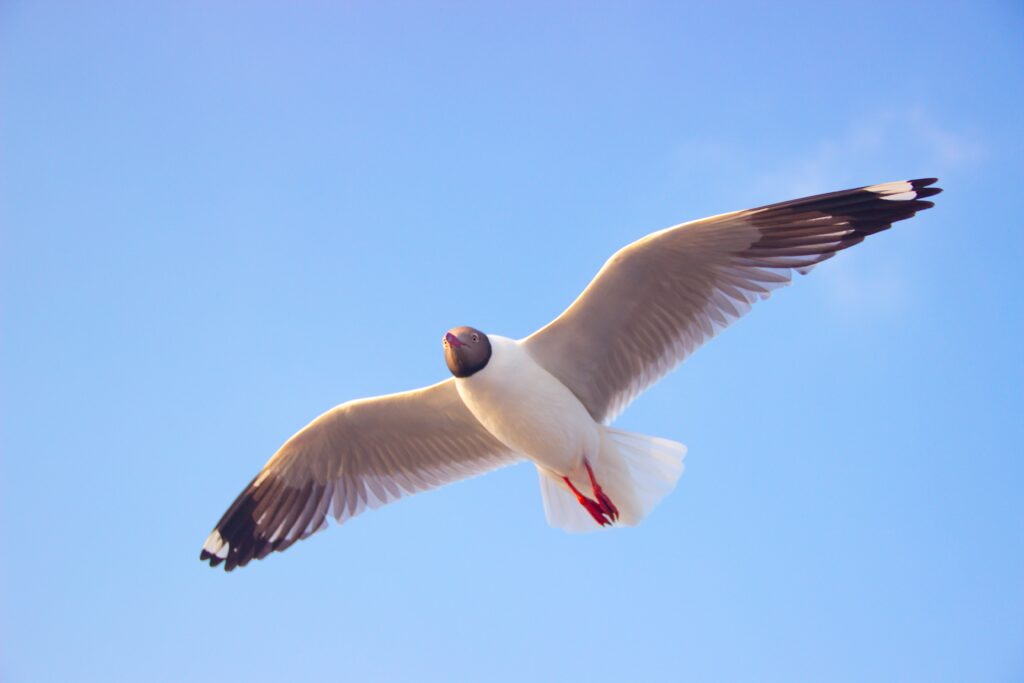Last updated on March 26th, 2024 at 06:17 pm
Many observe seagulls throughout the day, but where do seagulls sleep at night? Even though these birds often live in plain sight among humans, most people are not aware of how seagulls spend their nights. Read on and I will answer the question “Where do seagulls sleep?”.
Table of Contents
Where Do Seagulls Sleep?
Seagulls can be found in a variety of habitats during the day. From beaches to landfills, seagulls are abundant throughout the world. Though they are readily viewed during the day, many wonder what seagulls do at night. Where do seagulls sleep at night?
Seagulls maintain their adaptive nature during the night, sleeping in an assortment of locations. Many gulls prefer to float on water when they sleep, so some birds will seek out lakes or ponds as places in which to sleep. Other seagulls will snooze in parks, along beaches, and even in trees.
The following locations are good places to find a seagull sleeping:
- Lakeshores
- Sandbars
- City parks
- Landfills
- Reservoirs
- Rooftops
- Trees
How Do Seagulls Sleep?
Much like geese, seagulls may sleep in a variety of different positions. These birds may stand on one foot while they slumber or sit on the ground. Gulls commonly tuck their heads into the feathers of their wings when they sleep.
No matter how a gull sleeps, it is not likely to tuck its head into a position where at least one eye cannot watch for predators.
Gulls are naturally wary birds that have evolved the ability to close one eye while shutting off half of their brains. The other eye remains open and engages the active half of the brain as a safety precaution. Although these birds are legally protected from human persecution, gulls are food for many creatures.

When Do Seagulls Sleep?
Gulls can doze at any point during the day or night. When these birds are not foraging or flying, they are likely to be resting, preening, or sleeping.
Seagulls are diurnal by nature, meaning they are active during the day and fairly inactive at night. They often sleep through the darkness, but they may migrate at night as well. During such events, a gull may spend most of the night on the wing.
Therefore, seagulls snooze intermittently throughout the day, but the bulk of their rest is obtained after the sun sets.
Can Seagulls Sleep While Flying?
You now know that the answer to the question, “Do seagulls fly at night?” is yes. So, are you curious to know if they can sleep while flying?
Well, some birds are known to sleep while flying, but it is not known if gulls can sleep during migration. To perform this feat, birds can rest half of their brain while the other half remains conscious.
More research will need to be conducted before we know if these birds are capable of this behavior.
Where Do Seagulls Sleep In Cities?
Seagulls are among the few birds aside from pigeons and House Sparrows that seem to thrive in cities.
However, a seagull has to be more creative with where it sleeps in these urban hubs because beaches and lakes may be hard to find.
Despite the apparent lack of habitat, they are still often common sights in our cities. This raises the question, where do seagulls go at night in cities?
Seagulls could snooze in parks with ponds or on boats that may be docked in a nearby harbor. In some instances, they may even rest on top of buildings.
You may not expect to see seagulls sleeping in cities, but they are surprisingly willing to slumber in metropolitan areas. Given their adaptability, they are more willing to sleep in locations that other birds may not find to be suitable for slumber.

Do Seagulls Sleep Alone Or In Groups?
Seagulls are social birds, so though individuals are capable of sleeping alone, they prefer to be in groups.
There are pros and cons to sleeping in groups. Some of the benefits of sleeping in groups include increased predator detection and more protection from the elements. Some disadvantages of sleeping in groups include the greater likelihood of a predator attack and noisier sleeping conditions.
Gulls may sleep alone during migration when they’re unable to find others with which to rest. They have colonial breeding systems, so once they arrive at their breeding grounds, they will be surrounded by others who will sleep near them.
Where Do Seagulls Sleep When They’re Babies?
After hatching from their eggs, seagulls depend on their parents to care for them while they grow during the next few weeks. Unsurprisingly, baby seagulls sleep in their nests. Here, their parents can look after them and they can be relatively safe from predators.
Seagull parents may nap on top of their babies to keep them warm and safe. After a few weeks, the baby seagulls will be able to huddle together to stay warm and will be large enough to sleep without constant parental supervision.

Do Seagulls Sleep In The Same Place Every Night?
Do seagulls return to the same place to sleep every night? Well, the answer to this question will depend on what time of year it is.
Being naturally social, gulls breed colonially with sizable groups of other gulls. Once a pair stakes out their breeding territory, they will construct a nest and return to sleep by the nest every night.
Both mom and dad defend the nest and young from intruders, so both will want to be by the nest so they can keep an eye on their offspring.
In the nonbreeding season, they tend to continue sleeping in the presence of other gulls. They may return to a favored sleeping spot every night, but they may always move around and check out a variety of sleeping locations.
Therefore, gulls are more likely to sleep in the same location repeatedly during the breeding season, but they lack a “home” to which they can return every day.
How Long Do Seagulls Sleep?
Most bird species are not like humans who obtain several hours of deep slumber. Instead, birds tend to experience dozens of shorter bouts of rest throughout the day and night.
This is the case for seagulls, as they will wake up frequently as they sleep. Birds have evolved such a habit as a way to detect potential predators and survey their surroundings.
Since gulls are often found in sizable groups, an individual bird may not need to wake up as frequently as birds that sleep by themselves, but they still awaken regularly from their slumber.
Gulls receive perhaps 6 to 8 hours of sleep each day. Some will wake up every few minutes, while others may go for 15 minutes or more without waking up.

Do Seagulls Have Good Night Vision?
Knowing that seagulls can migrate during the night or watch for predators from their roosting location, you may figure that these creatures must have good night vision.
Well, this is not exactly true. While gulls are not helpless in the dark, their night vision is probably not much better than a human’s.
Gulls may use stars to navigate at night, so they may not need to possess terrific night vision. They likely have good enough night vision to detect a predator once it gets close, but on cloudy, moonless nights, gulls struggle to see.
The one exception to this rule seems to be the Swallow-tailed Gull, a bird that has to forage in the darkness to hunt its favorite food: squid.
Conclusion
Seagulls are ubiquitous, being one of the most well-known bird families in the world. Though they are common during the day, most people do not know about the sleeping habits of gulls.
In this article, I answered the question “Where do seagulls sleep?”. It turns out that they sleep in a variety of locations including bodies of water, parks, and beaches. In cities, seagulls may also be found resting on boats and buildings.
They have different sleeping habits than humans, as they experience many short bouts of sleep as they frequently survey their surroundings.

